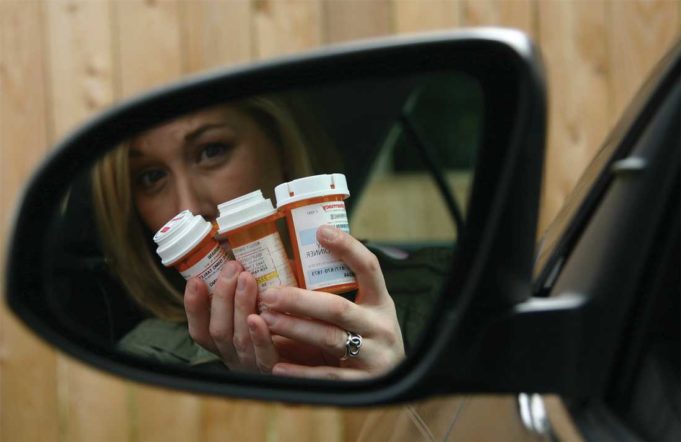The next time a trooper pulls us over and asks for public information, like, say, oh, a driver’s license, we’re going to tell him, “Sure, do you mind waiting 55 days?”
That’s how long we waited for public info from the Department of Public Safety, so it’s only fair.
Fort Worth Weekly associate editor Jeff Prince contacted DPS Press Secretary Tom Vinger in January via email, seeking information regarding the Commissioned Online Prescription System, a database available to police officers investigating cases of prescription abuse and fraud. A Fort Worth attorney said releasing prescription medicine information to police is like giving them access to your medicine cabinet without a warrant.
“It violates a person’s privacy,” said Fort Worth attorney David Sloane (“Pill Popper Party Pooper,” Feb 15, 2017). “Medical records are supposed to be private.”
The skeptic in us says the database might also reduce the number of potential clients seeking legal representation, but whatevs. There is a little thing called the Hippocratic Oath, which dates back to the Third Century B.C. and includes this passage translated from Greek: “I will respect the privacy of my patients, for their problems are not disclosed to me that the world may know.”
Typically, police officers request a subpoena to search or access private information or property in a criminal investigation. DPS says it releases information from the online database to police who are investigating prescription drug cases that meet the criteria spelled out in the Texas Health and Safety Code.
Sprinkled in among the criteria is a fuzzy statement that the database director can release info if “proper need has been shown to the director.” This makes it sound like the director could release the info every time police request it. Sloane wondered how many requests were being made and how often DPS released the info.
The database was housed at DPS for years until last September, when it moved under the purview of the Texas State Board of Pharmacy. However, the board’s executive director, Gay Dodson, said that DPS continued to maintain its own portal to the database and did not rely on the board for access to the info. Dodson suggested contacting DPS spokesperson Jay Alexander, who said to email questions to Vinger.
On Feb. 3, Prince asked Vinger for the number of requests being made by law enforcement officials for prescription information in the past three years and wondered, “How many of these requests has DPS granted?”
Prince asked again on Feb. 14 while the story was being prepared for print.
Vinger, a former radio news reporter who became a PIO at DPS in 1998, answered the question about how many requests had been made: 4,758. But he did not give the number of times those requests were granted. Instead, he sent an email saying, “The premise of this question is not accurate prior to Sept. 1, 2016.”
Prince was confused.
“I don’t understand what that means,” the writer wrote back. “Please explain.”
Vinger said he would send info the following day that would “answer the question accurately and not as the question is worded. That is the best I can do for you this evening.”
That meant the info would come after the story had been printed. Prince thanked Vinger and asked him to send the new info along as soon as possible since he planned to update the online version of the story.
Vinger, however, did not provide the info the next day or any other day and stopped responding to emails. On March 8, Prince submitted a public information request. On March 17, a DPS assistant general counsel sent Prince an email asking for more clarification, including the question, “Are you only seeking numbers, not actual requests?”
On March 30, DPS sent the numbers: From January 1, 2014, to March 10, 2017, police made 5,287 requests for prescription info from the DPS database. Of those requests, 5,154 were granted. That means DPS provides prescription info to police 97 percent of the time.
“That’s flabbergasting,” Sloane said.
Police, the lawyer continued, should cite suspects who are discovered possessing small amounts of prescription pills in unmarked containers. Then a suspect can go to court and present his prescription as evidence. Or not – kind of like how people who are cited for not having proof of insurance can go to court afterward and present their insurance statement and possibly have the ticket dismissed.
Instead, the online data system allows police to “peruse a person’s prescription record – info that would have been presented by the accused at the appropriate time,” Sloane said. “The value of that information does not justify the invasion of privacy.”
We would ask Vinger what he thought about Sloane’s statement, but we don’t feel like waiting two months for an answer, if he even bothers to write back at all.













“Don’t break the law and you won’t get into trouble.”
What are you smoking, what’s wrong with you? Folks get into trouble daily, and always have, that are not guilty and many, many are found not guilty. Quite a few square, honest people are mistreated and jerked around daily by indifferent, self-satisfied Cops and it’s always been this way it seems. My bird-dog is smarter than you Jimmy. Grow up. Good grief. You a Tea-Bagger? Your Mama proud of you? Get a life, amount to something.